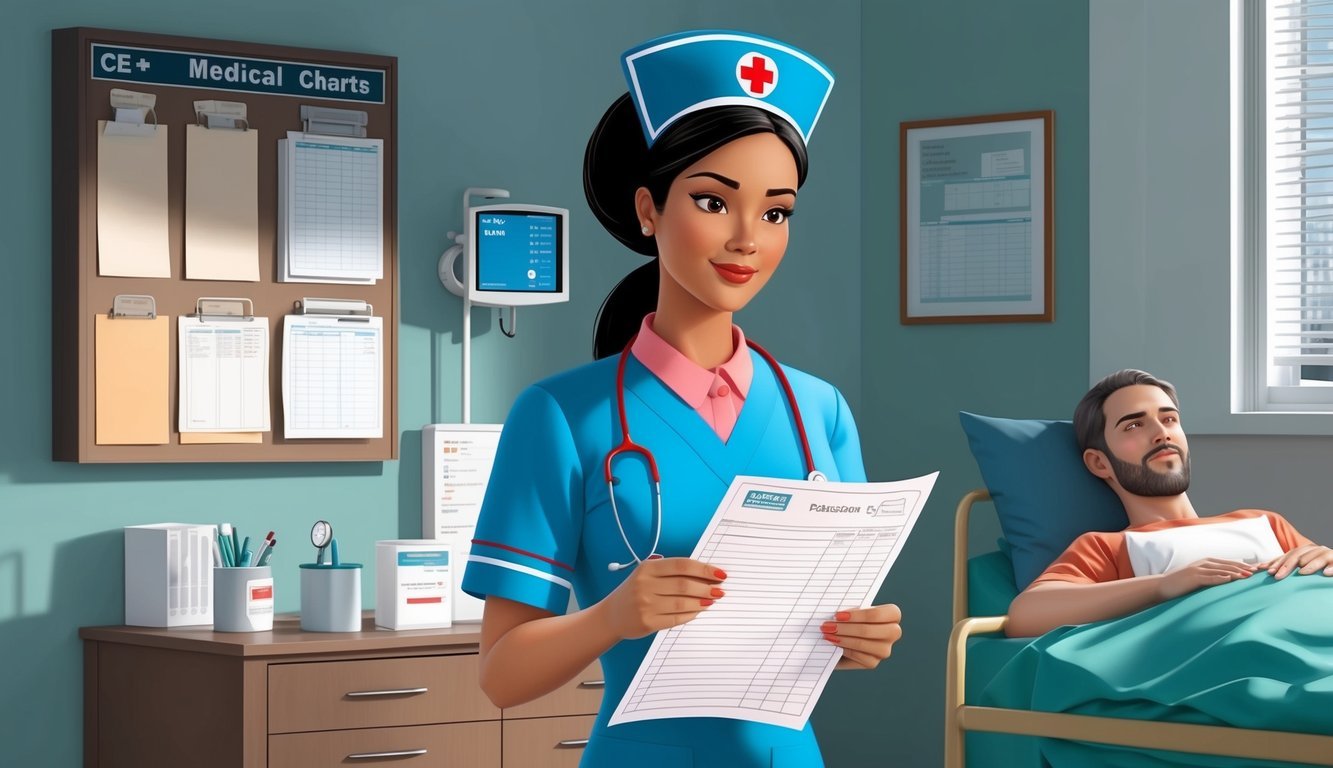The term RN stands for Registered Nurse, a key figure in the healthcare system. RNs are trained professionals who provide essential care to patients and collaborate closely with doctors and other healthcare staff.
Understanding the role of an RN is important, as they not only advocate for patients but also help in educating them about their health conditions.
As you explore this topic, you will learn about the diverse responsibilities that RNs carry in various settings, from hospitals to clinics.
Their role includes performing physical examinations, developing treatment plans, and ensuring patient safety.
RNs play a critical part in the healthcare team, making their contributions vital for patient outcomes.
The nursing field continues to evolve, with advancements in education and training leading to better healthcare practices.
By understanding the significance of RNs, you can appreciate the essential work they do and how they contribute to the medical community.
Key Takeaways
- RNs are vital healthcare professionals who care for and support patients.
- The role involves collaboration with various healthcare team members for optimal patient care.
- RNs undergo ongoing education to stay updated with advancements in the field.
The Role of RNs in Healthcare
Registered Nurses (RNs) play a vital role in healthcare.
Their responsibilities include providing direct patient care, supporting family members, and working closely with medical teams.
Understanding their educational pathways, certifications, and areas of specialization helps you appreciate their impact on patient outcomes.
Educational Pathways
To become an RN, you typically need a nursing degree, which can be obtained through various educational programs.
The most common paths are:
- Associate Degree in Nursing (ADN): A two-year program offered at community colleges. This is an entry-level pathway.
- Bachelor of Science in Nursing (BSN): A four-year degree that provides broader training and better career opportunities.
After graduation, you must pass the NCLEX-RN exam to obtain your RN license.
Some choose to further their education through RN-to-BSN programs, which are designed for those with an ADN who wish to earn a BSN.
Certifications and Licensing
In addition to your nursing degree, obtaining certifications can enhance your skills and job prospects.
After completing your formal education, passing the NCLEX-RN is essential for licensing.
You must also adhere to state regulations, which may require continuing education to maintain your license.
Certification areas can include:
- Basic Life Support (BLS): Essential for all RNs.
- Advanced Cardiovascular Life Support (ACLS): For those working in acute and emergency settings.
- Pediatric Advanced Life Support (PALS): Important for RNs in pediatric care.
Holding certifications can improve your employment opportunities and demonstrate your commitment to quality patient care.
Areas of Specialization
RNs can choose from various specialties, allowing them to tailor their careers based on interests and skills.
Some common areas of specialization include:
- Acute Care: Working with critically ill patients in hospitals.
- Emergency Department: Providing immediate care in urgent situations.
- Primary Care: Focusing on long-term patient relationships and preventive care.
- Nursing Homes: Caring for elderly patients, often requiring specialized training in geriatric care.
Each specialization requires specific skills and knowledge, making it essential for RNs to find the area that best fits their career goals.
This variety ensures that RNs can meet diverse patient needs in various healthcare settings.
Collaboration with Healthcare Professionals

In healthcare, collaboration is vital for providing quality patient care.
As an RN, you work closely with various healthcare professionals to ensure effective treatment plans and positive outcomes for patients.
This teamwork involves clear communication and understanding each role’s contributions.
Working with Doctors
As an RN, you regularly interact with physicians, including MDs and DOs, to coordinate care.
You help implement treatment plans and monitor patient progress.
Effective communication is crucial in these interactions.
Be prepared to provide updates on your assessments and any changes in a patient’s condition.
RNs often serve as the bridge between patients and doctors.
You must convey patient concerns and clarify medical instructions for patients.
Building good relationships with doctors enhances teamwork and fosters a more supportive environment for patient care.
Interdisciplinary Healthcare Teams
Interdisciplinary healthcare teams consist of various professionals, including nurse practitioners (NPs), physician assistants (PAs), and specialty nurses.
Each member brings unique skills to the table.
For instance, a family nurse practitioner focuses on preventive care, while a certified nurse midwife specializes in maternity.
You collaborate with colleagues like occupational therapists and certified registered nurse anesthetists to create comprehensive care plans.
Regular team meetings help all members stay informed.
By sharing insights and discussing treatment options, you can improve patient outcomes through a holistic approach.
Such collaboration is essential in settings like primary care and specialized clinics, where effective teamwork can significantly enhance patient experiences.
Diagnostic and Patient Care Responsibilities

As a registered nurse (RN), you play a vital role in both conducting diagnostic tests and monitoring patients’ vital signs.
These responsibilities are crucial for accurate diagnosis and effective patient care.
Conducting Diagnostic Tests
You are responsible for performing various diagnostic tests to help in identifying health issues.
Tests may include a complete blood count (CBC), liver function tests, and electrocardiograms (EKGs).
Each test provides valuable insights into the patient’s condition.
For example, a CBC can reveal signs of infections or anemia, while an EKG can indicate arrhythmias like atrial fibrillation.
In some cases, imaging tests such as magnetic resonance imaging (MRI) or chest x-rays may be required.
You ensure that these tests are performed accurately and that results are communicated promptly to the healthcare team.
Documentation of test results is crucial for ongoing patient care, guiding treatment decisions, and monitoring progress.
Monitoring Vital Signs
Regularly monitoring vital signs is a core duty.
You check parameters such as blood pressure, pulse rate, respiration rate, and temperature.
These signs are key indicators of patient health.
For patients with conditions like chronic obstructive pulmonary disease (COPD) or coronary artery disease, you must assess how well they are responding to treatments.
Vital signs can reveal complications like myocardial infarction or deep vein thrombosis.
You also pay attention to changes in activities of daily living (ADLs), as these can signal deterioration or improvement in a patient’s condition.
Timely and accurate monitoring helps in making critical decisions about patient care.
Maintaining a clear record of these vital signs aids in early detection of potential health issues.
Legal and Ethical Considerations in Nursing
In nursing practice, understanding legal and ethical considerations is crucial for ensuring effective patient care.
Two primary areas to focus on are patient privacy and advocacy, as well as navigating end-of-life care decisions.
Patient Privacy and Advocacy
As an RN, protecting patient privacy is one of your fundamental responsibilities.
You must ensure compliance with laws like HIPAA, which safeguards patient information.
Violating these regulations can lead to legal penalties and loss of trust.
Advocacy involves supporting patients in making informed decisions about their care.
You can help patients understand their rights, treatment options, and the implications of each choice.
Encouraging open communication with patients helps them express their preferences and feelings about their care.
You should also recognize the importance of obtaining informed consent.
This involves explaining procedures and ensuring that patients comprehend the risks and benefits before they agree.
Your role as an advocate reinforces patient autonomy and fosters a trusting relationship between you and your patients.
End-of-Life Care Decisions
End-of-life care requires sensitive handling of complex ethical issues.
As a healthcare provider, you may face situations where a patient has expressed their wishes regarding life-sustaining treatment or a Do Not Resuscitate (DNR) order.
It’s vital to have open discussions with patients and their families about their wishes and values.
You should respect these decisions and ensure they are documented accurately in the medical record.
Understanding advance directives helps you provide care that aligns with the patient’s wishes.
Additionally, you must navigate conflicts that might arise between family members regarding care decisions.
Balancing patient rights with family input can be challenging, requiring strong communication skills and ethical reasoning to guide the process.
Advancements and Continuing Education in Nursing

Continuous growth in nursing involves both advancements in techniques and ongoing education.
Staying updated is crucial for providing the best patient care and ensuring your skills meet current standards.
Innovations in Nursing Techniques
Nursing practices are continuously evolving with new technologies and techniques.
Innovations like telehealth, electronic health records (EHR), and advanced imaging systems are becoming standard in patient care.
Telehealth allows nurses to consult with patients remotely, improving accessibility for many.
EHR systems streamline patient documentation, enhancing accuracy and efficiency.
Training in these areas is often included in RN-to-BSN programs, which elevate your nursing education.
To stay competitive, a Bachelor of Science in Nursing (BSN) is increasingly preferred by employers.
As you pursue this degree, you’ll learn new nursing theories and practical skills that align with these advancements.
Ongoing Education and Training Opportunities
Continuing education is a vital part of a nursing career.
You need to complete nursing continuing education (CE) to maintain your license and enhance your knowledge.
Various options are available, including workshops, online courses, and conferences.
Online nursing programs offer flexibility, allowing you to balance work and further education easily.
Courses typically cover topics such as patient safety, advanced clinical practices, and emerging medical technologies.
Completing these can help prepare for the National Council Licensure Examination (NCLEX) and contribute to your professional development.
In addition, pursuing a Master of Science in Nursing (MSN) or a Doctor of Nursing Practice (DNP) can open doors to leadership roles in healthcare.
Each degree level, whether you choose an Associate Degree in Nursing (ADN) or advanced degrees, supports your journey for better patient outcomes.
Frequently Asked Questions

In this section, you will find answers to common questions about the role of Registered Nurses (RNs), key terms used in nursing, and the qualifications and responsibilities that come with being an RN.
Each question tackles important aspects of nursing and healthcare.
What are common nursing abbreviations used in patient charting?
Nursing abbreviations help keep patient records concise and clear.
Here are some common ones you might encounter:
| Abbreviation | Meaning |
|---|---|
| BP | Blood Pressure |
| HR | Heart Rate |
| IV | Intravenous |
| PRN | As Needed |
| CPR | Cardiac Pulmonary Resuscitation |
These abbreviations streamline communication among healthcare professionals.
How does the role and duties of a Registered Nurse (RN) differ from a physician?
RNs focus on patient care, monitoring, and education.
They provide direct support to patients and collaborate with doctors.
Physicians, on the other hand, diagnose and treat illnesses and develop treatment plans.
RNs often serve as the link between patients and physicians.
What constitutes the typical responsibilities of a Registered Nurse?
RNs have a variety of duties, including:
- Assessing patient health
- Developing nursing care plans
- Administering medications
- Educating patients and families about health conditions
These responsibilities ensure comprehensive care for patients in various settings.
What qualifications are required to earn the designation of a Registered Nurse?
To become an RN, you typically need one of the following:
- An Associate Degree in Nursing (ADN)
- A Bachelor of Science in Nursing (BSN)
After completing a program, you must pass the NCLEX-RN exam to obtain your nursing license.
Ongoing education is often required to maintain licensure.
How do nursing abbreviations aid in medical communication?
Nursing abbreviations make it easier for healthcare providers to document and share patient information quickly.
This efficiency helps reduce errors and improves the clarity of communication.
Understanding these terms is essential for effective teamwork in healthcare settings.
How do RN salaries compare within the healthcare industry?
RN salaries vary based on factors like location, experience, and specialization.
Data from regulatory bodies shows that RNs typically earn competitive salaries compared to other healthcare roles.
For a more detailed look at RN salaries, visit Nurse.org.

